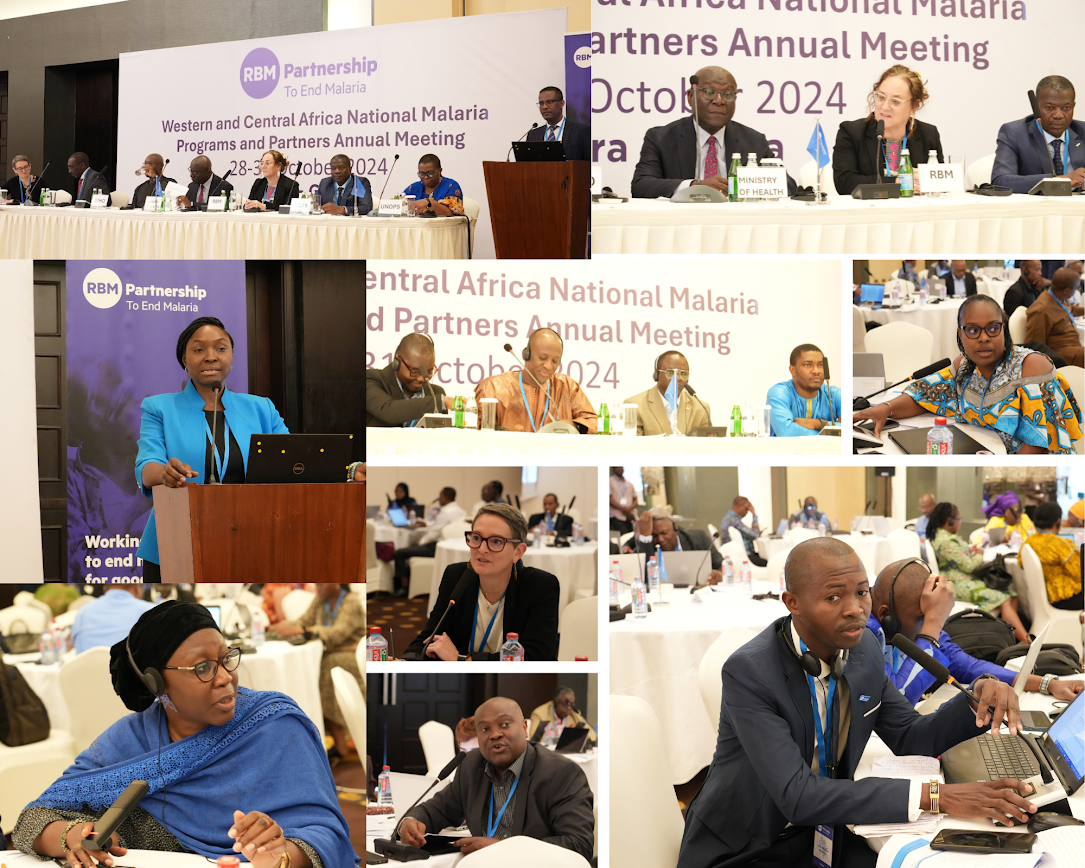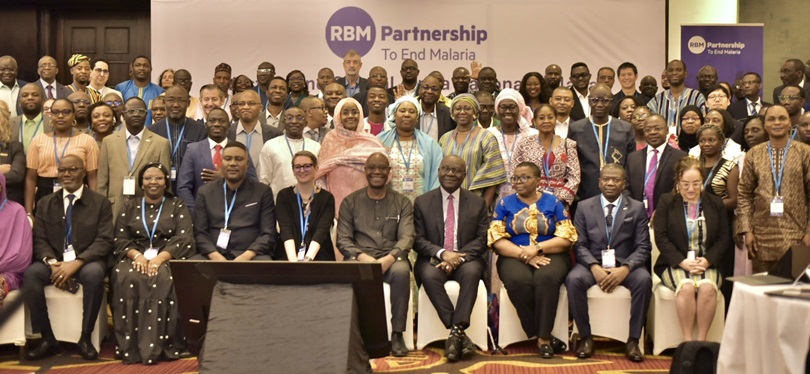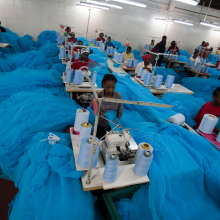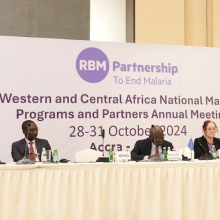The 2024 Western and Central African National Malaria Programmes and Partners Annual Sub-Regional Meeting in Accra, Ghana, brought together stakeholders from 22 countries, key international partners like BMGF, WHO, UNICEF, USAID/PMI, the Global Fund and RECs, as well as the private sector. This diverse gathering underscored the power of collaboration in tackling malaria, one of Africa’s most persistent public health challenges.

Dr Michael Adekunle Charles, CEO of the RBM Partnership to End Malaria, set the tone for the event with a powerful reminder of the gravity of the malaria burden: “More than half a million people still die from malaria every year; children under five are especially vulnerable. We must address the resource gaps, biological threats, and the effects of climate change, which continue to worsen the situation.” His words underscored the urgency for a coordinated, multi-sectoral approach to eradicate malaria
Echoing Dr. Charles’ call for collaboration, H.E. Madame Yvette Kapinga Ngandu, Economic Community of Central African States Commissioner, highlighted the ongoing malaria challenge, particularly in Central Africa. She noted that Health Ministers in the ECCAS sub-region have reaffirmed their commitment to making malaria eradication a top priority. She also shared that with the support of the RBM Partnership to End Malaria, the African Leaders Malaria Alliance, and the World Health Organization (WHO), the ECCAS Commission has developed a regional strategic plan to accelerate malaria elimination across its 11 member states. Commissioner Ngandu also informed the participants that ECCAS is currently launching the Central African Health Organization.
Dr. Frank Lule, Head of the WHO-Ghana Country Office, shared a personal reflection: “Since I began using mosquito nets in 1993, I haven't had malaria. These interventions work.” However, he acknowledged the ongoing challenges, emphasising that malaria still claims lives. Dr. Lule pointed out that the RBM Partnership is well-placed to address challenges such as conflict, climate change, and the control of malaria. He called on attendees to use the event as a springboard toward achieving malaria elimination, stating, "This year, HBHIC signed the Yaoundé Declaration. Nobody can do it alone. Let’s strengthen our collaboration and work across sectors to control and eliminate malaria.”
Dr. Darius Kofi Osei, Advisor to the Minister of Health, Ghana, officially opened the meeting on behalf of the Hon. Minister of Health. He expressed the Government of Ghana’s gratitude for hosting the event and celebrated the country’s progress in malaria control. “Through our National Elimination Strategic Plan, we have made significant strides in reducing malaria mortality and infection rates. The malaria testing rate has increased from 38% in 2012 to 98% in 2023,” he shared. He emphasised the importance of regional coordination in malaria elimination and concluded, “Today, we gather to learn from and be inspired by countries that have either achieved malaria elimination or are well on their way.”

Tackling insecticide resistance through comprehensive strategies
The experiences of Côte d'Ivoire and Guinea Bissau offer valuable insights into addressing biological threats, particularly insecticide resistance. Côte d'Ivoire has seen persistent high malaria incidence despite ongoing efforts, underscoring the importance of surveillance in guiding control strategies. In Guinea Bissau, long-term use of long-lasting insecticidal nets (LLINs) has led to insecticide resistance, prompting the country to adopt innovative strategies, such as combining pyrethroid and PBO insecticides. These cases highlight the need for integrated approaches, combining entomological surveillance with community engagement, to ensure sustainable vector control.
Strengthening drug resistance mitigation
Burkina Faso, Equatorial Guinea, and Nigeria are taking proactive measures to combat antimalarial drug resistance. Burkina Faso’s use of multiple first-line treatments and Equatorial Guinea’s focus on aligning study criteria with the country’s epidemiological realities are important steps in combating resistance. Nigeria’s strategies, including simultaneous deployment of multiple ACTs and continuous surveillance of resistance markers, demonstrate the importance of adapting treatment protocols to meet evolving challenges. These lessons underscore the importance of surveillance, strategic planning, and communication to ensure the efficacy of antimalarial drugs.
Digital innovation in malaria interventions
Digital tools are transforming malaria interventions in Ghana and Congo. By transitioning from paper-based systems to digital tools, Ghana has enhanced the accuracy and timeliness of malaria intervention data, improving decision-making processes. Similarly, Congo’s use of stock management tools in its 2023 ITN campaign has yielded positive results, despite challenges such as limited connectivity and device failures. These innovations demonstrate the value of leveraging technology to enhance malaria control efforts, although more investment in infrastructure and training is needed.
Integrated strategies for malaria elimination
Mauritania’s Malaria Elimination Project and Cabo Verde’s successful journey to malaria-free status highlight the importance of integrated, evidence-based strategies. Mauritania has emphasised the need for robust diagnostic systems, case-based surveillance, and coordinated stakeholder engagement. Cabo Verde’s success story underscores the importance of a strong political will, intersectoral collaboration, and culturally grounded social and behaviour change initiatives in achieving malaria elimination.
Advances in malaria vaccine implementation
The 2024 meeting also highlighted significant strides in malaria vaccine implementation. With the WHO prequalification of the R21/Matrix-M vaccine and the expanded roll-out of malaria vaccines in the region, there is renewed hope in the fight against malaria. Successful strategies in countries like Guinea and Burkina Faso, which combine vaccination efforts with seasonal malaria chemoprevention, have improved vaccine uptake. These developments are key in reducing the malaria burden and improving child survival rates in West and Central Africa.
Equity Human Right Gender and Equality (EHRGE) to remove barriers to malaria interventions.
A training session equipped participants from various countries and partners with tools to design more equitable malaria programs, focusing on equity, human rights, gender, and equality (EHRGE). Participants committed to applying these principles and using resources like the Malaria Matchbox toolkit to identify gaps and ensure interventions reach the most vulnerable populations. The session highlighted a shared commitment to fostering inclusive and effective malaria programs, aiming to reduce the malaria burden and improve health outcomes for all communities.
A unified effort to eliminate malaria
The 2024 Western and Central African Malaria Programmes and Partners Annual Sub-Regional Meeting served as a reminder of the importance of collaboration in malaria control and elimination efforts. With renewed commitment, innovative solutions, and a coordinated approach across sectors, the goal of malaria elimination in Africa is within reach. As Dr. Michael Adekunle Charles aptly stated, "Together, we can and must eliminate malaria."
Latest Blogs



